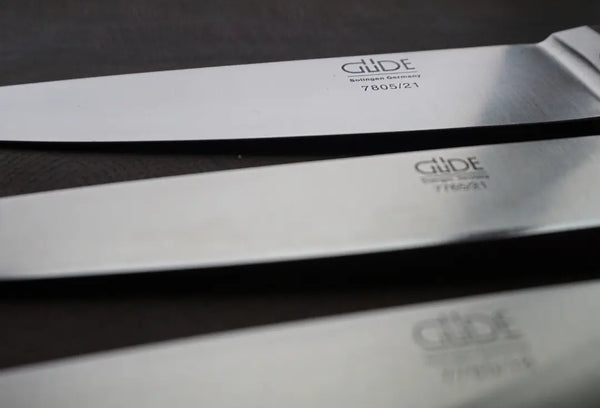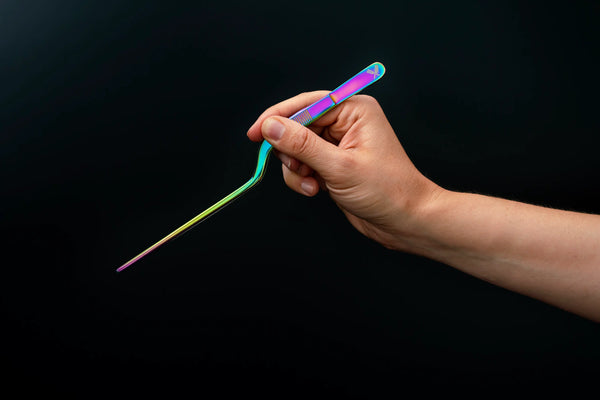
Solingen, where the chef's knife comes from
The history of the production of chef's knives in Solingen
Whenever chef's knives are mentioned in Germany, references to Solingen are usually not far behind. Solingen, located in the Bergisches Land region, is the center of German blade manufacturing. Many of the leading companies in this field are headquartered in the city.
Solingen has almost 160,000 inhabitants and is located – somewhat simply put – between Wuppertal and Düsseldorf. The city officially bears the nickname "City of Blades."
We now want to focus on knife manufacturing in Solingen and, in particular, on the companies from which we offer a wide range of chef's knives.
The tradition of blade manufacturing in Solingen dates back several centuries. The first documented mention of blade manufacturing in the city dates back to 1363.
In 1401, the formation of a guild of hardeners and grinders is recorded, and in 1571 a guild of knife makers was founded.
The inscription on swords “Me fecit Solingen” (roughly translated: “Solingen made me”) became a seal of quality in past centuries, a medieval precursor to “Made in Germany”.
In the 16th and 17th centuries, blade manufacturing experienced enormous growth; Solingen swords were widely known and widespread throughout Central Europe. The Solingen blade industry was the city's most important economic factor for centuries.
During and after the First World War, this economy stagnated considerably because sales markets collapsed.
Today, blade manufacturing remains an important economic sector in Solingen. Knives and cutlery, as well as razor blades and scissors, and other related products are produced in large quantities.
One special feature is the Solingen Ordinance. This is a German legal regulation that protects the term "Solingen" in connection with cutlery. The name "Solingen" may only be used for products that have been processed and manufactured at all essential stages of production within the Solingen industrial area and the city of Haan.
The German Blade Museum in the Solingen district of Gräfrath commemorates the history of blade making. Numerous exhibits from the past of Solingen blade making are on display here, with vivid explanations of the origin and use of blades. It also houses the world's most extensive cutlery collection.
Manufacturers of chef's knives from Solingen, represented at Cheflife
A significant portion of our chef's knife selection—along with Japanese knives—is provided by Solingen knife manufacturers. They are listed in alphabetical order.
Güde
The Güde company was founded in 1910 by Karl Güde. Since then, it has been continuously family-owned and operated, now in its fourth generation. It is a traditional, owner-managed family business. At the time of the company's founding, there were several thousand craft businesses in Solingen that were engaged in the manufacture of cutlery.
Here, chef's knives are still produced in small quantities and of the highest quality using traditional methods, with a lot of manual work.
Since its founding, Güde's knives have been drop-forged, ground by hand, provided with handles and honed by hand.
A chef's knife goes through 55 work steps before it can be handed over to the customer and supports them in their creative work.
Franz Güde, the son of founder Karl Güde, took over the company in 1923. The economic situation was very difficult; the loss of the First World War and rampant inflation severely impacted the entire economy of the time. But Güde remained true to his principles and survived this difficult time.
Franz Güde was primarily concerned with developing new methods for grinding knives.
In 1923, the symbol of the three palm trees was introduced as Güde's new trademark. This became world-renowned among experts as the symbol of knives from Solingen.
In 1931, Franz Güde invented the recessed toothing for use in bread slicers and slicing machines. This remains the most common toothing for such devices today.
1941 was the year the "Güde serrated edge" (with sharp teeth) was invented. This grind significantly increased the edge retention and cutting ability of corresponding knives.
In 1954, Franz Güde's son, Franz D. Güde, took over management of the company. By that time, the number of Solingen cutlery businesses had already declined considerably. Automation and rationalization had caused many businesses to go under.
Only by maintaining high quality standards was Güde able to assert itself on the market.
The current owner, Dr. Karl Peter Born, grandson of Franz Güde, has headed the company since 1983. He has consistently maintained the quality standard through extensive manual work, thus maintaining and expanding Güde's reputation and success.
Güde's most famous product is probably the ingenious 32 cm long bread knife, which has delighted every user in various versions.
Under the current owner, the company has also started producing Damascus knives, thus adding these sophisticated products to its product range.
In addition to the popular and well-known classics, Güde's chef's knives have been coming up with new shapes in recent years:
- The Knife
- Chai Dao
- Shark
- Synchronization
Several Güde chef's knives have been awarded prestigious design prizes in recent years:
- Good Design Award
- Business Longlife Design Award
- Red Dot Design Award
- Design Plus Price
Güde, a company committed to tradition with a long history, which continues to surprise with innovations even today.
Here we would like to give you an insight into knife production at Güde with a video.
Felix Solingen
FELIX SOLINGEN GMBH is one of the oldest manufacturers of chef's knives in the world. It was founded in 1790 by Karl-Gustav Felix.
At the time, the Felix family was engaged in farming. Knifemaking was initially a side business, but soon became their main occupation. The company "Gustav Felix Schneidwarenfabrik" was founded.
Over the centuries, Felix has always placed quality first. The traditional manufacturing of most products, combined with high-quality raw materials, established the excellent reputation of the Solingen blacksmiths and has maintained it to this day.
This hasn't changed since the company became part of the Swiss Zepter Group in 2012. The products are still predominantly manufactured and finished by hand. Only the distribution network has been expanded and expanded into new markets with the support of the new owner.
Production essentially begins with the forging of the knife blank in a die. Some blanks (usually the cheaper models) are also stamped. High-alloy blade steel is used. All blanks are ice-hardened. By the time a knife leaves the factory and is ready to be handed over to the customer, approximately 45 different production steps have been completed, most of them by hand.
The blanks are ice-hardened, some are vacuum- and ice-hardened. After forging or stamping, the blank is ground. Here, it is first brought into its final shape with several grinding passes. This is followed by fine grinding, known as peening.
At Felix Solingen, the blades are grease-polished and slightly matte-ground. This creates a fine surface structure on the blade with a deliberate slight roughness. This is expressly desired to prevent cut material from sticking too much to the surface of the knife. This grease-polishing also provides additional corrosion protection.
Next comes the assembly of the handles. The handles are shaped to fit the blank, then the surfaces are smoothed. The grit of the sanding belts becomes increasingly finer until the result meets Felix Solingen's quality standards.
Finally, the knife undergoes a final inspection. Experienced employees examine each piece under a special light that would reveal even the smallest imperfections.
Only flawless pieces are put on sale, where they then serve as adequate tools for both professional chefs and the large number of hobby cooks, conveying joy in their work and allowing for precise work.
Nesmuk
The manufacturers of high-quality chef's knives that are relevant for most chefs mostly come (with a few exceptions) from Solingen and have a long tradition, some dating back over a hundred years.
In recent years, a new name has emerged in the ranks of manufacturers of sophisticated kitchen knives: The name Nesmuk has catapulted itself to the top of these manufacturers in just a few years, although its origins are not to be found in Solingen.
The Nesmuk company originated in Wunstorf, Lower Saxony, near Hanover. There, a blacksmith named Lars Scheidler, for a long time in secret, produced fine knives in tiny batches. Scheidler experimented with new materials and crafted, among other things, outstanding Damascus knives.
At first, he was known only among insiders. This changed when he met two merchants who themselves had an affinity for knives and recognized Scheidler's talent. They decided to market the products jointly and founded the company Nesmuk. The high-quality knives immediately captivated the crowd of chefs – new shapes and new materials found their fans.
The ensuing growth required more staff – and where do you find good employees for the production of high-quality kitchen knives? Solingen, of course. Consequently, the company relocated to the blade city in the Bergisches Land region, where it has since established itself among the ranks of well-known knife manufacturers.
Nesmuk knives bring new shapes to the kitchen. The first Nesmuk knife, the Soul, is based on a shape that's several thousand years old.
From the very beginning, it was clear to us that we wanted to include these outstanding and innovative Nesmuk knives in our range. And Nesmuk knives also have fans at Cheflife.de who want more than just a sharp cutting tool.
Ancient but proven shapes, outstanding innovative materials and the finest workmanship make the hearts of lovers of excellent chef's knives beat faster.
Nesmuk knives are consistently more expensive than knives from established manufacturers, all of whom also make good knives.
But – for example – there are also different preferences among car drivers. One person only wants a Golf, another prefers a sports car made in Swabia. Even with a Golf, you can get from A to B perfectly. But with a sports car, those who can or want to afford it have a bit more fun. This comparison is sometimes part of our answer when someone asks why they should buy such an expensive knife. Prices start at between 300 and 400 euros for a knife and rise into the four-digit range for Damascus knives. It's not just the fun of working with such an extraordinary tool.
Nesmuk knives are the result of years of development work, extensive research and experiments in the search for the best possible materials, unusual shapes, fine handle materials and perfect workmanship.
Wüsthof
Another long-established Solingen family business is Wüsthof. The seventh generation is now in management.
The first mention of a "Wüsthof Scissors Factory, Steel and Iron Goods" in a local directory dates back to 1814. This suggests that chef's knives have been manufactured under the Wüsthof name in Solingen for over 200 years. The owner at the time was Johann Abraham Wüsthof.
In 1869, the company Eduard Wüsthof was registered in the company register. Eduard was the son of Johann Abraham.
In 1881, his successor, Robert Wüsthof, established initial relationships with the USA on a business trip to New York in order to broaden sales markets. Since then, the company has exhibited at national and international trade fairs.
In May 1895, the trident, which is still used today, was registered as a trademark of Wüsthof with the Imperial Patent Office in Berlin.
Even the turmoil of the two world wars, inflation, and the Great Depression could not stop the company's survival. The company survived these difficult times and can now be proud of its successful existence.
Over 400 employees at the Solingen location and over 480 employees in total work for Wüsthof (as of 2018). The chef's knives offered at Cheflife.de are all German-made – meaning "Made in Germany."
Many of the knives offered are drop-forged at around 1200 degrees Celsius; some lower-priced models are precision laser-cut from stainless steel plates. All Wüsthof knives are made from high-quality, stainless chrome-molybdenum-vanadium steel. The alloy used contains 0.5% carbon, 15% chromium, and smaller amounts of molybdenum and vanadium.
The manufacturing process for forged knives comprises approximately 55 steps. This includes hardening to approximately 58 Rockwell. This is an ideal compromise between hardness and flexibility. Excessive hardness makes the blades stronger, but also somewhat more brittle. Wüsthof products are sold in approximately 80 countries. Wüsthof has its own sales companies in the USA and Canada.
Here, you can see that tradition and modernity are perfectly combined in Solingen. Old names and young companies exist side by side, fulfilling customers' desires for good chef's knives.
Incidentally, the sales company of the Japanese company Kai is also based in Solingen; we will come back to this in a separate article.










